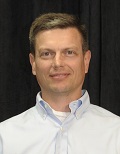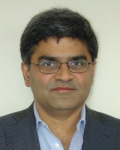Keynote Speakers
The technical conference program is honored to host 3 distinguished keynote speeches on the most recent developments in parallel systems hardware, software and applications:
- Build Watson: An Overview of DeepQA for The Jeopardy! Challenge
- Dr. Eric W. Brown, IBM T.J. Watson Research Center
- Towards a Science of Parallel Programming
- Prof. Keshav Pingali, University of Texas at Austin
- Raising the Level of Many-Core Programming with Compiler Technology – Meeting a Grand Challenge
- Prof. Wen-mei Hwu, University of Illinois at Urbana-Champaign
Keynote Address I on Monday, September 13, 8:30 am
Build Watson: An Overview of DeepQA for The Jeopardy! Challenge
Eric W. Brown
IBM T.J. Watson Research Center
Yorktown Heights, NY
Abstract:
Computer systems that can directly and accurately answer peoples' questions over a broad domain of human knowledge have been envisioned by scientists and writers since the advent of computers themselves.
Open domain question answering holds tremendous promise for facilitating informed decision making over vast volumes of natural language content.
Applications in business intelligence, healthcare, customer support, enterprise knowledge management, social computing, science and government would all benefit from deep language processing.
The
DeepQA project is aimed at illustrating how the advancement and integration of Natural Language Processing (NLP), Information Retrieval (IR), Machine Learning (ML), massively parallel computation and Knowledge Representation and Reasoning (KR&R) can greatly advance open-domain automatic Question Answering.
An exciting proof-point in this challenge is to develop a computer system that can successfully compete against top human players at the
Jeopardy! quiz show.
Attaining champion-level performance Jeopardy! requires a computer to rapidly answer rich open-domain questions, and to predict its own performance on any given category/question.
The system must deliver high degrees of precision and confidence over a very broad range of knowledge and natural language content and with a 3-second response time.
To do this DeepQA generates, evidences and evaluates many competing hypotheses.
A key to success is automatically learning and combining accurate confidences across an array of complex algorithms and over different dimensions of evidence.
Accurate confidences are needed to know when to
buzz in
against your competitors and how much to bet.
Critical for winning at Jeopardy!, High precision and accurate confidence computations are just as critical for providing real value in business settings where helping users focus on the right content sooner and with greater confidence can make all the difference.
The need for speed and high precision demands a massively parallel compute platform capable of generating, evaluating and combing 1000's of hypotheses and their associated evidence.
In this talk I will introduce the audience to the Jeopardy! Challenge and describe our technical approach and our progress on this grand-challenge problem.
Bio:
Eric Brown is a Research Staff Member and Manager at the IBM T.J. Watson Research Center in Yorktown Heights, NY.
Eric earned his Ph.D. in Computer Science at the University of Massachusetts, Amherst and was a member of the Center for Intelligent Information Retrieval at UMass.
Eric joined IBM in 1995 and has conducted research in information retrieval, document categorization, text analysis, question answering, bio-informatics, and applications of automatic speech recognition.
Since 2007 Eric has been working on the DeepQA project at IBM and the application of automatic, open domain question answering to build the Watson Question Answering system.
The goal of Watson is to achieve human-level question answering performance.
Eric is involved in the architecture and scale out of DeepQA, as well as special question processing for Watson.
Keynote Address II on Tuesday, September 14, 8:30 am
Towards a Science of Parallel Programming
Keshav Pingali, Professor
University of Texas at Austin
Department of Computer Science
W.A."Tex" Moncrief Chair of Computing in the Institute for Computational Engineering and Sciences (ICES)
Keynote slides available for download
Abstract:
In spite of more than 40 years of work on parallel programming, we have few insights into how to exploit the performance potential of multicore processors.
In this talk, I will argue that this problem arises largely from the limitations of the program-centric abstractions like dependence graphs that we currently use to think about parallelism.
I will then propose a novel data-centric abstraction called the operator formulation of algorithms, which reveals that a generalized form of data-parallelism called amorphous data-parallelism is ubiquitous in diverse applications ranging from mesh generation/refinement/partitioning to SAT solvers, maxflow algorithms, stencil computations and event-driven simulation.
I will also show that the operator formulation can be used to perform a structural analysis of algorithms that can be exploited for efficient implementations of these algorithms.
Finally, I will describe a system based on these ideas called Galois for programming multicore processors.
Bio:
Keshav Pingali is a Professor in the Department of Computer Science at the University of Texas at Austin, and he holds the W.A."Tex" Moncrief Chair of Computing in the Institute for Computational Engineering and Sciences (ICES) at UT Austin.
He was on the faculty of the Department of Computer Science at Cornell University from 1986 to 2006, where he held the India Chair of Computer Science.
Pingali's research has focused on programming languages and compiler technology for program parallelization, restructuring, and optimization.
He is a Fellow of the IEEE, Fellow of the American Association for the Advancement of Science, and is the Editor-in-chief of the ACM Transactions on Programming Languages and Systems.
He also serves on the NSF CISE Advisory Committee (2009-2011).
Keynote Address III on Wednesday, September 15, 8:30 am
Raising the Level of Many-Core Programming with Compiler Technology – Meeting a Grand Challenge
Wen-mei Hwu, Professor
University of Illinois at Urbana-Champaign
Sanders-AMD Endowed Chair in the Department of Electrical and Computer Engineering
Coordinated Science Laboratory
Keynote slides available for download
Abstract:
Modern GPUs and CPUs are massively parallel, many-core processors.
While application developers for these many-core chips are reporting 10X–100X speedup over sequential code on traditional microprocessors, the current practice of many-core programming based on OpenCL CUDA, and OpenMP puts strain on software development, testing and support teams.
According to the semiconductor industry roadmap, these processors could scale up to over 1,000X speedup over single cores by the end of the year 2016.
Such a dramatic performance difference between parallel and sequential execution will motivate an increasing number of developers to parallelize their applications.
Today, an application programmer has to understand the desirable parallel programming idioms, manually work around potential hardware performance pitfalls, and restructure their application design in order to achieve their performance objectives on many-core processors.
In this presentation, I will discuss why advanced compiler functionalities have not found traction with the developer communities, what the industry is doing today to try to address the challenges, and how the academic community can contribute to this exciting revolution.
Bio:
Wen-mei W. Hwu is a Professor and holds the Sanders-AMD Endowed Chair in the Department of Electrical and Computer Engineering, University of Illinois at Urbana-Champaign.
His research interests are in the area of architecture, implementation, and software for high performance computer systems.
He is the director of the IMPACT research group.
For his contributions in research and teaching, he received the ACM SigArch Maurice Wilkes Award, the ACM Grace Murray Hopper Award, the Tau Beta Pi Daniel C. Drucker Eminent Faculty Award, and ISCA Most Influential Paper Award.
He is a fellow of IEEE and ACM.
He leads the GSRC Concurrent Systems Theme.
He co-directs the new $18M UIUC Intel/Microsoft Universal Parallel Computing Research Center with Marc Snir and serves as one of the principal investigators of the $208M NSF Blue Waters Petascale computer project.
Dr. Hwu received his Ph.D. degree in Computer Science from the University of California, Berkeley.

















